Evangelical Press Study Commentary (22 vols.)
Digital Logos Edition
For the full updated collection, see the Evangelical Press Study Commentary (26 vols.).
Overview
The Evangelical Press Study Commentary (22 vols.) brings you the best in biblical exposition from some of the most notable evangelical Reformed scholars. This series is aimed at the minister, theologian, layman, and serious student alike. Though comprehensive in content, the volumes are practical and straightforward. Each author presents a careful analysis of the biblical text to grow your understanding of Scripture, and delivers simple applications to challenge that growth.
With the Logos Bible Software edition, you have instant access to all twenty-two volumes of this important commentary series along with a wealth of dictionaries, lexicons, and language reference tools. All Scripture passages are linked directly to the original language texts and English translations, and double-clicking any Greek or Hebrew word automatically opens a lexicon to help you decipher its meaning and understand its context. That makes the Logos edition of the Evangelical Press Study Commentary the most useful and accessible for students, pastors, and scholars.
- Thorough introductions to each book of the Bible
- Verse-by-verse commentary
- Readable and applicable exposition
Evangelical Press Study Commentaries are invaluable tools for ministers, theologians, and serious students of the Scriptures. This series is both ‘readable and user-friendly.’
—Banner of Truth
Overall this is a scholarly, reliable commentary from the evangelical Reformed perspective, which will enlighten the serious Bible student.
—Evangelicals Now
It is not over the head of the average reader, nor beneath those who know more. These volumes are for layman and minister alike.
—The Gospel Magazine
The EP Study Commentary series fills a needed gap in contemporary biblical commentary. The volumes in this series evidence and model careful biblical exposition and biblically grounded application in the service of the church. They do such in such a way as to be able to profit pastors, teachers, and readers without specialized theological training alike.
—Dr. Guy Waters, professor of New Testament, Reformed Theological Seminary
- Title: Evangelical Press Study Commentary
- Publisher: Evangelical Press
- Volumes: 22
- Pages: 9,503
This title is included in the following collections
You can save when you purchase this product as part of a collection.
Evangelical Press Study Commen...
$577.73$461.992025 Preacher Platinum Library
$1,499.99$1,199.99Logos 6 Reformed Platinum Lega...
$1,499.99$1,499.992025 Preacher Diamond Library
$2,999.99$2,249.99
- $2,999.99$2,249.99
- $2,999.99
- $2,999.99
- $4,749.99$3,562.49
- $4,749.99
- $4,749.99
- $4,749.99
- $4,749.99
- $10,999.99$8,249.99
- $11,399.99
- $23,999.99$17,999.99
- $21,749.99
- $24,999.99
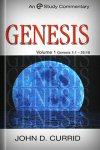
Genesis is a book about beginnings—the creation of the universe, the formation of mankind, the establishment of the covenant, and the founding of the people of Israel. Many Christians regard the Old Testament as merely a collection of interesting stories to be taught in Sunday school, but which have little application for the church today except as providing examples or illustrations from a bygone, almost barbarous, age.
The truth is that almost every important church doctrine is found in “seed” form in the book of Genesis—creation, fall, redemption, the doctrine of the Trinity, the promise of the Messiah, the establishment of the covenant, and the hope of the resurrection are all to be found here. A “seed” is planted in Genesis and then it sprouts and grows throughout the rest of the Bible until it finds its fruition in the person and work of Jesus Christ. God created the universe; it fell through the sin of humanity; and now God is in the process of redeeming it through the work of Christ. This latter work continues even now until the time of the end when all things will be put in their final place.
Dr. Currid provides solid exegesis in an accessible way, matched with practical application that displays the relevance of this Old Testament book for the twenty-first century. This volume covers the period from the creation up to the death of Abraham and the marriage of Isaac and Rebekah.
Sufficiently scholarly to give [them] credence in the academic world, but at the same time . . . sufficiently straightforward to make [them] accessible to any serious student of the Bible.
—Banner of Truth
Greatly to be welcomed is the writer who can combine scholarly, accurate fidelity to the text, while maintaining a readable and easily accessible style. But such we have here. Dr. Currid’s commentary is a very welcome addition to this series.
—English Churchman
John D. Currid is Carl McMurray Professor of Old Testament at the Reformed Theological Seminary in Jackson, Mississippi. He received his PhD degree in archaeology from the Oriental Institute at the University of Chicago.
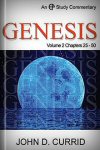
Genesis, vol. 2: Chapters 25:19–50:26
- Author: John D. Currid
- Publisher: Evangelical Press
- Publication Date: 2003
- Pages: 432
At the beginning of Scripture, the Holy Spirit, through the prophet Moses, introduces us at once to God in the essential fullness of his being. It is to God and God alone that we are brought. We hear him, through the divine revelation, penetrating earth’s silence, shining into the primordial darkness, with the sole intent of creating a sphere in which he might display his sovereignty, incomparability, and power. Unlike too many recent scholarly works on this book that have concentrated on the formation and development of the Pentateuch, John Currid is concerned to focus on the content and theology of this first book of the Bible. Indeed almost every important church doctrine is found in “seed” form in the Book of Genesis. This volume covers the lives of the patriarchs Jacob and Joseph, ending with the Israelites living in Egypt.
John D. Currid is Carl McMurray Professor of Old Testament at the Reformed Theological Seminary in Jackson, Mississippi. He received his PhD degree in archaeology from the Oriental Institute at the University of Chicago.
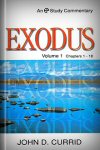
This commentary on the text of Exodus has been written for the building up of the church. It not only provides insights into the book of Exodus, but also clear and concise application. It is a book for everyone who wants to understand better what God says to us in His Word. The author writes, “It is my hope that pastors will use it for sermon preparation, and others for Bible study preparation and personal study.”
Dr. Currid provides solid exegesis in an accessible way matched with practical application that displays the relevance of this Old Testament book for the twenty-first century. This volume covers the first 18 chapters of Exodus, telling the account of the deliverance of the children of Israel from Egypt to their arrival at Sinai. It is the story of the persecution of God’s people, their release from the domination of Pharaoh’s Egypt to the crossing of the Red Sea. Central to this narrative is the birth, life, and ministry of Moses.
John D. Currid is Carl McMurray Professor of Old Testament at the Reformed Theological Seminary in Jackson, Mississippi. He received his PhD in archaeology from the Oriental Institute at the University of Chicago.
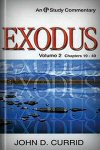
Exodus, vol. 2: Chapters 19–40
- Author: John D. Currid
- Publisher: Evangelical Press
- Publication Date: 2000
- Pages: 400
This volume on Exodus chapters 19–40 covers the giving of the law at Mount Sinai and the institution of the Old Testament system of worship, culminating in the consecration of the tabernacle, the visible symbol of God’s presence with his people. The account which began with Israel enduring oppression and in slavery to Pharaoh concludes with them enjoying freedom and traveling to the land of promise with the only true God present with them and leading them.
John D. Currid is Carl McMurray Professor of Old Testament at the Reformed Theological Seminary in Jackson, Mississippi. He received his PhD degree in archaeology from the Oriental Institute at the University of Chicago.
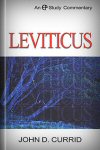
Leviticus used to be the first book of the Bible read and studied by children in the synagogue. In the church, it is perhaps the last one read, if it is ever given any attention at all. One of the reasons that the book of Leviticus is so little studied in the church is a lack of understanding about the relevance of the literature to the New Testament Christian. What do all these legislative texts in the Pentateuch have to do with life in the church?
In this matter, we should take to heart Paul’s admonition that “All Scripture is inspired by God and profitable for teaching, for reproof, for correction, for training in righteousness; so that the man of God may be adequate, equipped for every good work.” Thus, Leviticus, being part of “all Scripture,” must have an enduring value and quality for the believer of any age.
The book of Leviticus is indispensable for teaching the Christian the depth and heinousness of human sinfulness. The chasm that separates a holy God from an unholy humanity stems from this pervasive iniquity. Yet Leviticus holds out a promise that mankind can be made right with God and live according to his statutes. It truly underscores the love of God for his people, and that he has a plan of salvation for them. But one also realizes that the sacrificial system of Leviticus is insufficient and cannot make people right with God. It points out that something greater is needed. It demands a final atonement. Thus, more than any other book of the Old Testament, Leviticus foreshadows and adumbrates the coming of the Messiah and his wondrous work of atonement.
Here he has produced a fine commentary in the conservative evangelical vein using grammatical-historical methodology.
—The Crisswell College, Dallas, TX
The reader doesn’t need to be familiar with the Hebrew to use this commentary. Currid writes for the most part in an easy-to-read style, but delves into technical or linguistic complexities when he needs to.
—Evangelical Times
This volume is one in a series of Evangelical Press Study Commentaries. It follows John Currid’s other volumes on Genesis and Exodus. The approach is to provide a non-technical and accessible commentary which avoids laborious comparisons of scholarly opinions, and should thus appeal to those who simply want help in opening up the meaning of Leviticus for Christians. This is a clearly written commentary that will well serve the needs of laity and preachers alike.
—The Reformed Theological Review
John D. Currid is Carl McMurray Professor of Old Testament at the Reformed Theological Seminary in Jackson, Mississippi. He received his PhD degree in archaeology from the Oriental Institute at the University of Chicago.
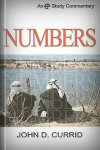
Numbers
- Author: John D. Currid
- Publisher: Evangelical Press
- Publication Date: 2009
- Pages: 479
The place of the book of Numbers in the literary pattern is clear. First of all, it concludes Israel’s stay at Sinai, and it prepares the people for the march to the land of promise (1:1–10:10). Secondly, the book records the actual journey from Sinai to the plains of Moab, and it ends with Israel prepared to launch a campaign into the land of promise. It is telling that the final word of the book is “Jericho”; this anticipates the book of Joshua, in which the tribes make an assault on the land by first attacking the site of Jericho.
John D. Currid is Carl McMurray Professor of Old Testament at the Reformed Theological Seminary in Jackson, Mississippi. He received his PhD degree in archaeology from the Oriental Institute at the University of Chicago.
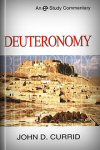
When Jesus was asked what the greatest commandment was, he cited a passage from Deuteronomy 6 as the fundamental and first tenet of Scripture. The purpose of Deuteronomy is to teach the people of God how to behave in every area of life. And the two main principles of that teaching are to fear God and to obey his commandments.
Using his own translation from the original Hebrew, Dr. John Currid ably demonstrates that the book of Deuteronomy is an official document ratifying the formal covenant relationship between God as the sovereign King and his covenant people, Israel. At the close of the 40 years of wandering in the wilderness, and on the eve of the entry into the Promised Land, Moses summons the Israelites to a solemn reaffirmation and ratification of the covenant first made at Sinai and promises great blessings to the people if only they will remain faithful to the covenant and obey God’s Word.
Christians too need to remember that God has made a covenant with the church. And, therefore, we need to ask the question: “What does Yahweh your God ask from you?” The answer is found in Deuteronomy: we need to fear God, we need to walk in his way, we need to love him, we need to serve him, and we need to keep his commandments. And, like Israel of old, if we live in obedience to the Word of God then we shall be wise and understanding and, indeed, God will greatly bless his people if they obey his Word.
Commentaries tend to fall roughly into two sorts. There is the spiritual, and there is the practical. This is practical, with New Testament references and spiritual comment nearly all confined to the application at the end of each section. This method of comment is really a necessity today, as our faith is so under fire.
—The Gospel Magazine
I thoroughly recommend not only this volume but the whole series on the Pentateuch by this author . . . This really is a most helpful and useful commentary which could be dipped into as required or, better still, read through to gain the overall perspective of this last book of Moses.
—The English Churchman
Dr. Currid’s expertise in biblical archaeology comes to the fore time and again, helpfully providing external testimony to the objective truth of the text of Deuteronomy as a covenant document, and moreover, as the Word of God.
—Grace Magazine
John D. Currid is Carl McMurray Professor of Old Testament at the Reformed Theological Seminary in Jackson, Mississippi. He received his PhD degree in archaeology from the Oriental Institute at the University of Chicago.
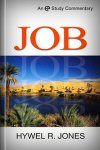
The book of Job has been highly spoken of by many, both inside the Christian church and out. Thomas Carlyle, the nineteenth-century man of letters, wrote of it, “I call it, apart from all theories about it, one of the grandest things ever written with pen. . . . There is nothing written, I think, in the Bible or out of it, of equal literary merit.” Martin Luther described it as “magnificent and sublime as no other book of Scripture.”
As a part of Holy Scripture, it is imbued with a far higher inspiration than any one of the world’s great classics. By it, God aims to instruct and encourage His people in their earthly pilgrimage towards heaven, just as He does in all the other books of the Bible. But the breadth of its appeal should not be forgotten. Set outside the life of Israel, the book of Job provides a ready-made point of contact with unchurched people. There are so many who have lost their way, either because they do not ask the big questions about life, or because they are swamped by the fact that there seem to be no real answers to them. By its presentation of both the grim realities of human existence and the wonder of divine grace, the book has something to say to any who would consult it seriously. It therefore supplies excellent material for lively and relevant preaching to people of every culture, not only by way of edification, but also evangelism. This commentary is written partly in the hope that such preaching will take place.
The book of Job is one of the oldest books in the world, and one of the most fascinating ever written. It has been highly spoken of and often quoted from by secular as well as Christian writers. In line with the approach adopted in the Study Commentary series, the author takes a thoroughly Reformed approach . . . A helpful commentary.
—Ulster Bulwark
Here is a rarity; a commentary one can sit and read, and then find oneself compelled to take to the study and work through, with open Bible all over again. Just don’t miss it!
—Evangelicals Now
Hywel R. Jones became professor of practical theology at Westminster Seminary, California in 2000. Prior to that he was editorial director of the Banner of Truth Trust and principal of London Theological Seminary from 1985–1996. He was a pastor at Grove Chapel in London and Borras Park in Wrexham.
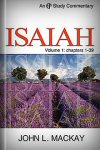
Isaiah, vol. 1
- Author: John L. Mackay
- Publisher: Evangelical Press
- Publication Date: 2008
- Pages: 864
Volume one covers chapters 1–39. There were no investigative journalists in the ancient world to bring to the attention of the public matters which the rich and powerful wished to keep hidden. But to a certain extent their role was fulfilled in ancient Israel by the prophets of Yahweh, amongst whom was numbered Isaiah. He exposed the follies of the rich, oppression in society, commented on the inadequacies of foreign alliances, and resolutely confronted wayward kings.
The role of a prophet, however, differed in many key respects from that of a journalist. For one thing, the prophet was called and commissioned by God for the role that he had to play. A true prophet did not opt for this as a career: it was divinely assigned to him.
John L. Mackay is a minister of the Free Church of Scotland. After several years in the pastorate in Rosskeen, Easter Ross, he was appointed Professor of Old Testament in the Free Church College, Edinburgh, in 1983, and has lectured there ever since. He has also engaged in a widespread speaking ministry, and has written expository commentaries on several Old Testament books, including Exodus and Jeremiah.
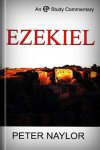
Ezekiel’s call to the prophetic ministry came to him in exile in Babylonia during the period leading up to the final capture of Jerusalem and destruction of the temple. The first half of the book which bears his name pronounces God’s judgment on his people in the face of the widespread belief that, despite their persistent unfaithfulness and idolatry, God would never ultimately permit their city or temple to be overthrown. Yet, even in the midst of judgment, God had not utterly abandoned his people, and later chapters of the prophecy look forward to a future time when a redeemed Israel would once more worship and serve God in the land which he had promised to their fathers. But Ezekiel’s vision has an even broader scope and the prophecy culminates in a glorious depiction of the new heavens and earth, in which heavenly realities are portrayed using the language and symbolism appropriate to Ezekiel’s own day, but foreshadowing the revelation which in New Testament times would be granted to the apostle John.
Peter Naylor (1937–2007) obtained his MTh at the University of London, and then studied semitics at the Hebrew University in Jerusalem. He was also awarded a PhD from Potchefstroom University, South Africa. Before retirement he pastored congregations in Suffolk and then at Wellingborough, Northants, England.
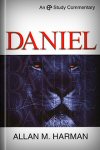
As humans we can never fully understand the mind of God, but He has revealed what is necessary for us to know of Himself and His ways. God has given us sufficient teaching to encourage us to persevere, but we are also able to look forward with expectancy. The book of Daniel has inspired Christians throughout the centuries to faithful and obedient service in the face of danger and persecution.
Daniel and his companions were living far from their own homes and land, in a culture that was dominated by a faith situation completely antagonistic to their own, yet they remained conscious of their continuing commitment to the God of Israel. While occupying significant posts in the Babylonian Empire, they refused to abandon their loyalty to and trust in God—sometimes at great personal cost—and were prepared to die rather than renounce their faith.
Faced with the might of Babylon, the exiles might have been tempted to doubt whether the God of Israel was truly God, or whether there was any hope for His covenant people. However, the prophecies revealed to Daniel assured them—and Christians today—that, though human kingdoms will continue to rise and fall, and despite seeming setbacks from time to time, God’s kingdom will ultimately prevail and He will be acknowledged as the Sovereign Ruler over all.
For readers today, as for God’s people of old, the book of Daniel calls us to dedicated commitment to God and His kingdom. In everything, Christ must have the supremacy and we eagerly wait for the final revelation of his glory.
. . . this is a helpful exposition of a portion of Scripture that seems confusing to many.
—Peace and Truth
Another fine contribution to the ongoing EP Study Commentary series, and following the same format. It is thought-provoking stuff and a worthy volume to stand in this series—strongly recommended.
—English Churchman
This is an elegant commentary on a potentially difficult book of the Bible. . . . There are sensible and helpful introductory articles and a lucid commentary on the text. Harman’s experience shows through with a careful explanation of the text, always aware of previous commentators but not in thrall to any of them. For preachers the clear, and thoughtfully laid-out exposition of the passage is augmented by a limited application section at the end of each chapter. If you want one general commentary on Daniel, this would be a good one to go for.
—Rev. Clive Alder
Allan Harman was for twenty years the principal of the Presbyterian Theological College, Melbourne, Australia. Since 2002 he has been a research professor at the college.
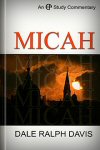
The prophet Micah lived in dark times. He was one of a small remnant of faithful believers living in a godless society where corruption and violence were rife, the vulnerable were the victims of exploitation and the religious leaders failed to speak out against the people’s sin, but instead gave them the message they wanted to hear.
Micah often seemed to be a lone voice as he faithfully proclaimed God’s Word, warning of judgment to come on the nation—a judgment from which even the believing remnant would not be exempt. Yet at the same time he also preached a message of hope, pointing his hearers forward to the coming of Christ and to the future glories which await the true people of God, Jews, and Gentiles alike. With such a prospect in view, the book closes on a note of triumphant praise to God as the prophet marvels at His grace and faithfulness to His people.
Using his own translation from the Hebrew, Dale Ralph Davis shows how many of the situations Micah addresses are very relevant to the experiences of Christians in various parts of the world in our own day. He presents the prophet, and the faithful remnant to whom he ministered, as an example and encouragement to us all to start living the life of the next age in this present age, and to trust God’s promises—however dark our circumstances may appear—in the assurance that He has a glorious future yet to come for His church.
Dale Ralph Davis is Teaching Elder at Woodland Presbyterian Church, Hattiesburg, Mississippi, and previously served as professor of Old Testament at Reformed Theological Seminary, Jackson, Mississippi.
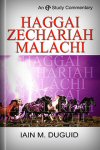
The last three books of the Old Testament, Haggai, Zechariah, and Malachi, have not always received the attention they deserve from the church. This is in some ways surprising, since the Gospel writers quote Zechariah 9–14 more often than any other biblical source in explaining Christ’s sufferings and death.
One reason for the tendency to neglect these three books lies in the fact that they address a community who were living in a day of small things, with little glory and no great triumphs to show off to a watching world. In a day like ours, which puts such a premium on charismatic leaders whose ministries exude glory and success, they may be viewed as something of an embarrassment.
But if, like the apostle Paul, we are content to be broken vessels without glory in ourselves so that the glory of Christ crucified may be all the more plainly displayed, then we shall find much blessing in these books. In them, we shall read of the comfort and challenge that come from the presence of the living God in our midst, even when His glory is not on public display. In them, we shall also read of the anticipation of the day when the glory of God would come to earth in the person of Christ and bring about the long-promised salvation of his people.
Iain Duguid is professor of Old Testament at Grove City College in Pennsylvania and pastor of Christ Presbyterian Church. He received his PhD in Old Testament from the University of Cambridge. He is the author of several commentaries and other scholarly and pastoral books, including The NIV Application Commentary: Ezekiel and Numbers: God’s Presence in the Wilderness.
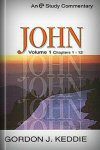
John, vol. 1: Chapters 1–12
- Author: Gordon J. Keddie
- Publisher: Evangelical Press
- Publication Date: 2001
- Pages: 511
The Gospel of John has been called “the most amazing book that was ever written.” Like no other book of the Bible, it contains the entire message of God’s Word in microcosm. It takes us from eternity to eternity and shows the centrality of Jesus Christ to our lives, to human history and to the meaning of the cosmos itself. For that reason, it must be at the very core of the preaching and evangelistic ministry of the Christian church. People need to hear and understand the message of the cross as expounded by John.
In this commentary, which arises from preaching through John’s Gospel several times in the course of over a quarter of a century of pastoral ministry, Gordon Keddie’s approach is thoroughly expository and keeps the focus on the proclamation of Jesus Christ to the heart, mind and conscience of the reader. This volume will prove helpful, not only to preachers, but to all who want to be gripped and molded by the brilliance and clarity of this marvelous Gospel and the Savior it so winsomely proclaims.
Gordon J. Keddie is a pastor at Southside Reformed Presbyterian Church in Indianapolis, Indiana. He graduated from the University of Aberdeen (BSc) and Edinburg (DipEd). He received his MDiv from the Reformed Presbyterian Theological Seminary and has written several books, including You Are My Witnesses: The Message of the Acts of the Apostles and The Practical Christian: The Message of James.
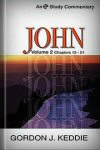
John, vol. 2: Chapters 13–21
- Author: Gordon J. Keddie
- Publisher: Evangelical Press
- Publication Date: 2001
- Pages: 446
In volume two, Gordon Keddie concludes his commentary on John by analyzing its last nine chapters.
Gordon J. Keddie is a pastor at Southside Reformed Presbyterian Church in Indianapolis, Indiana. He graduated from the University of Aberdeen (BSc) and Edinburg (DipEd). He received his MDiv from the Reformed Presbyterian Theological Seminary and has written several books, including You Are My Witnesses: The Message of the Acts of the Apostles and The Practical Christian: The Message of James.
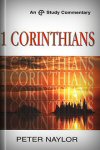
Although 1 Corinthians was originally written with the needs of the Corinthian congregation in mind, Paul aimed his words at “all who in every place call upon the name of our Lord Jesus Christ, theirs and ours” (1:2). If he wrote for the Corinthians, he also wrote consciously for all of us, without reference to where and when we live. When we read the epistle, we feel that the Lord of glory is speaking to our hearts.
One of the dominant themes of this letter is the continuity between Old Testament Israel and the emergent New Testament churches. Within the whole community of the faithful there can be no theoretical estrangement between Jews and Gentiles, nor even between those who knew the Lord before his first coming and those of us around the globe who have been born and born again since Christ came. Abraham, about four thousand years ago, and the last sinner to be converted in future time belong to each other because they both belong to the Lord Jesus.
The problem at Corinth was that too many in the church were spiritually and emotionally immature. Dragging their feet, they found it difficult to respond to the moral demands of the gospel and were reluctant to abdicate the cultural norms of their city in favor of commitment to the scandal of a crucified Messiah.
Paul urges the Corinthians to reconsider the Christ whom he preaches; even if in so doing they discover that they have to repudiate traditional values. While the unbelieving world regards the message of the gospel as foolishness, for the believer the cross of Christ is nothing less than “the power of God.” The discerning saint knows that his life has been transformed both by what Christ did for him at Calvary and by what the Lord has effected within him by the Spirit.
Peter Naylor obtained his MTh at the University of London and studied Semitics at the Hebrew University in Jerusalem. More recently he was awarded a PhD in Baptist history and dogma from Potchefstroom University, South Africa. Prior to retirement, he had spent many years as a Baptist minister and was the minister of Tabernacle Baptist Church, Wellingborough, Northamptonshire.
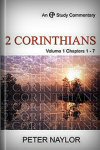
2 Corinthians, vol. 1: Chapters 1–7
- Author: Peter Naylor
- Publisher: Evangelical Press
- Publication Date: 2002
- Pages: 368
The second of Paul’s two letters to the Corinthians to be included in the New Testament tells of strength in weakness, comfort in distress, provision in need, fellowship in loneliness, certainty in doubt, guidance in perplexity, protection in peril, and hope for the future. Above all, it tells of the surpassing love of Jesus Christ: if Paul the apostle loved and cared for the troublesome Corinthian church as intensely as he did, he no more than reflected, albeit dimly, the grace of God to His believing people.
Joy in the Lord and in His people, pastoral tenderness, righteous anger, self-vindication in the interests of the ministry, profound theology, and concern for harmony, both at home and with churches elsewhere, all vie for expression. Each strand interweaves with the others. This volume covers the first seven chapters of the epistle, in which an introduction is followed by a review of Paul’s labors for the church up to the time of writing, with special emphasis placed upon the excellence of the ministry of the new covenant.
Peter Naylor obtained his MTh at the University of London, then studied Semitics at the Hebrew University in Jerusalem. More recently he was awarded a PhD in Baptist history and dogma from Potchefstroom University, South Africa. Prior to retirement, he had spent many years as a Baptist minister and was the minister of Tabernacle Baptist Church, Wellingborough, Northamptonshire.
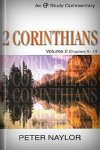
2 Corinthians, vol. 2: Chapters 8–13
- Author: Peter Naylor
- Publisher: Evangelical Press
- Publication Date: 2002
- Pages: 304
The overall aim of this book is to explain 2 Corinthians with reference to the real-life situation addressed by Paul when he wrote, and with the hope that the study may illuminate the abiding importance of the letter. Paul was almost certainly aware that the document would remain in the developing body of writings to be recognized in due time as our “New Testament.”
Peter Naylor obtained his MTh at the University of London, then studied Semitics at the Hebrew University in Jerusalem. More recently he was awarded a PhD in Baptist history and dogma from Potchefstroom University, South Africa. Prior to retirement, he had spent many years as a Baptist minister and was the minister of Tabernacle Baptist Church, Wellingborough, Northamptonshire.
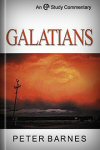
Galatians
- Author: Peter Barnes
- Publisher: Evangelical Press
- Publication Date: 2006
- Pages: 368
Of all Paul’s letters, the epistle to the Galatians is undoubtedly his most fiercely worded, more so even than the two Corinthian letters. The problem in the churches in Galatia was that they had heard the gospel from the great apostle Paul, but then proceeded to modify it. A little poison in the cup may be all that is needed for the cup to be toxic. To be specific, the Galatians began to listen to the Judaizers who were telling them that they needed to be circumcised, keep the Jewish holy days, and, by implication, maintain Jewish food laws which prevented them from eating with Gentiles.
It is well-known that the epistle to the Galatians played a highly significant role in the sixteenth-century Reformation, and Martin Luther was to refer to it as “my own Epistle, to which I have plighted my troth.” He thought that “This doctrine can never be taught, urged, and repeated enough.” Galatians takes us to the very heart and core of the message of God to us in Jesus Christ. Ultimately, its message is simplicity itself: law condemns, Jesus saves. This is a message which the modern evangelical world needs to hear in a new and fresh way.
This book has very good introductory matter, well and clearly explained. Would you understand ‘the new perspective’ that has been sweeping the evangelical world this last decade? Then it is dealt with here faithfully, as are other major matters.
—The Gospel Magazine
This commentary will be a valuable addition to the bookshelves of ministers and students of the Bible. I liked three particular things. Firstly, when it benefits the exposition of the verse, Barnes introduces the original Greek and its fuller meaning. Secondly, he makes mention of other interpretations—but shows by cogent argument that they are unlikely at best and incorrect at worst. Thirdly, each section is rounded off with an application, which occasionally includes valuable information from church history but is always searching for us today.
—Evangelical Times
The reader is presented with a very straightforward exposition of the teaching of this book. This is a preachers’ commentary, written by a preacher for preachers. It is didactic and direct and burns with the spirit that longs to proclaim to all both far and wide that by faith in Jesus Christ alone the sinner can be right with the Lord of Glory.
—New Life Magazine
The reader is often given very good illustrations of the main point under discussion from church history, which Dr. Barnes teaches at the Presbyterian Theological College in Sydney. These could easily be used in sermons and Bible studies.
—Australian Presbyterian
The whole work has the feeling, unusual in such a large volume, of having been preached to ‘real’ people, rather than lectured to students! There have been many recent commentaries on Galatians, but this one should stand the test of time. Highly recommended.
—Peace and Truth
Barnes draws on past and present writers, listed in a ten-page bibliography, to elucidate the text or to show how the text has been misunderstood. Each chapter ends with helpful application to the reader’s life.
—Grace Magazine
Dr. Barnes well understands that this epistle is not for the polite, merely intellectual commentator, for the most urgent issues in the contemporary religious world are related to its truth.
—Iain Murray, Founder, Banner of Truth Trust
Peter Barnes is the pastor at Revesby Presbyterian Church in Sydney, Australia, and also the lecturer in Church History at the Presbyterian Theological Centre in Sydney.
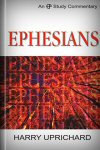
Christ the exalted Lord is the constant theme of the epistle to the Ephesians. Christ is always and everywhere the exalted Lord, and He is the exalted Lord expressly for the benefit of His people, the church. The remarkable way in which the benefits of Christ’s lordship are enjoyed by his people means that, in Ephesians, Christology is inextricably focused upon the doctrine of the church, a detail set in contrast with other letters by Paul.
The upshot of this is that Ephesians represents a letter of eulogy, prayer, exhortation, and instruction where the enthroned and cosmic Christ is constantly seen as bestowing blessing after blessing on His people, the church. This engages every subject mentioned in the letter. Salvation, prayer, faith, the church, the gospel, regeneration, and Christian living are all variations of the one symphony, the blessings ‘in the heavenly places’ which Christ the exalted Lord gives to his church. This is the keynote of this commentary.
This is a simple and helpful exposition, by an experienced pastor as well as an able scholar.
—Foundations 56
Harry Uprichard’s book deserves a wide readership. It would make an ideal outline for a midweek Bible study group. It will most certainly find a special place on the shelf of the pastor concerned with regularly feeding ‘the flock of Christ.’
—English Churchman
Harry Uprichard lives in Co. Antrim, Northern Ireland, where he has been the minister of Trinity Presbyterian Church, Ahoghil, for three decades. A graduate of Queen’s University, Belfast, his master’s degree deals with the relationship between Jesus and John the Baptist, and his doctorate investigates Paul’s theology behind 1 Thessalonians. He has also taught at Belfast Bible College, contributed to a symposium on the church and its unity and maintained a keen interest in music. He is author of A Son is Revealed—Christ in Mark, A Son is Promised—Christ in the Psalms, and A Son is Given—Christ in Isaiah.
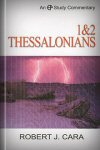
1 and 2 Thessalonians
- Author: Robert J. Cara
- Publisher: Evangelical Press
- Publication Date: 2009
- Pages: 303
By studying 1st and 2nd Thessalonians, we get to read some of Paul’s first scriptural statements about the glories of Christ. We also notice Paul’s great compassion and love toward this young Thessalonian church, which may have been only six months old when Paul is writing First Thessalonians. Despite being young, she is doing generally well. Although it is true that there are some difficulties; most of these are caused by those outside the church, but some are caused by those inside the church. All of these aspects have direct and indirect meaning for us today in the 21st century. Of course, all books in the Bible and all parts of all biblical books are important and are worthy of our study because ultimately the Triune God wrote them for the original readers and for us.
’If you are interested in the stability of a gospel-driven and Christ-centered life, the Second Coming, how to bear up under persecution, how to grow in the midst of adversity, and how to engage in everyday life to make an impact for Christ, then this commentary will be invaluable in your library. Dr. Robert Cara is obviously well known as a professor and teacher. Those gifts have been successfully transferred to the written page to benefit any and all students of the Word as well as preachers and teachers. He is not only faithful and clear to the inspired text but is helpful and insightful in how to communicate the marvelous panoply of Biblical truth found in this captivating portion of Holy Scripture. Obtain it, read it and keep it because you will want to use it again!’
—Dr. Harry L. Reeder, III. Pastor of Preaching and Leadership, Briarwood Presbyterian Church, Birmingham, Alabama
Dr. Cara has produced an outstanding commentary on the two Thessalonian letters. While capably and pastorally explaining these letters’ teaching on the Return of Christ, Dr. Cara skillfully points us to the other treasures that God has given us in 1–2 Thessalonians. Whether you are preparing to teach these letters or are looking to grow in your personal understanding of Scripture, this volume needs to be on your desk.’
—Guy Prentiss Waters, Associate Professor of New Testament, Reformed Theological Seminary, Jackson, Mississippi
Robert J. Cara is Hugh and Sallie Reaves Professor of New Testament and Chief Academic Officer at the Reformed Theological Seminary, Charlotte. He obtained his BS from Pennsylvanian State University, MDiv from Reformed Theological Seminary, and PhD form Westminster Theological Seminary.
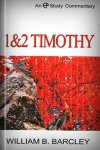
If we were to take a poll of modern Christians and ask them what they think are some of the key issues facing the church today, what would be on that list? Certainly it would include things like, what is at the heart of the ministry of the church? How should women participate in the church? How important is the preaching ministry of the church, and what should the church’s preaching look like? How much diversity can we allow in the teaching and preaching ministry of the church? What is the church’s responsibility to the poor? What type of leadership should the church have? Who should occupy positions of leadership? What should the worship of the church entail?
The questions of today are not all that different from the questions the church wrestled with in the middle of the first century. And the good news is, Scripture has answers to these questions. In particular, the apostle Paul deals with these issues as he writes his two letters to his friend and co-worker, Timothy. He may not treat them as exhaustively as we might like. He may not give specific answers to all of our modern questions. But he gives us guidance in wrestling with many of the problems and struggles that face the church today.
William Barcley is Associate Professor of New Testament. Before coming to Reformed Theological Seminary, Dr. Barcley served for seventeen years at Gordon College where he taught a wide variety of classes. His primary area of teaching and research has been the Pauline Epistles.
Reviews
2 ratings

Faithlife User
2/8/2018

Ralph A. Abernethy III
9/7/2017